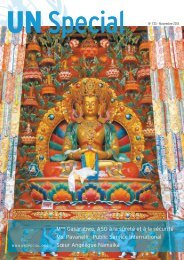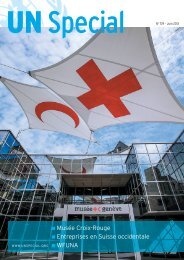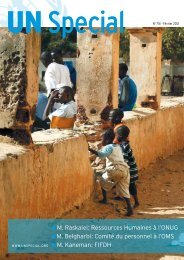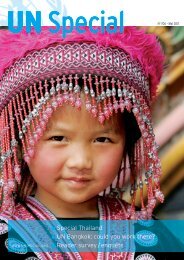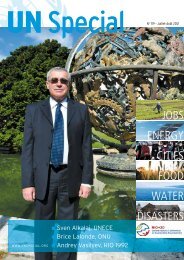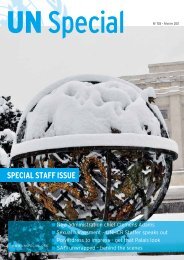PDF version - UN Special
PDF version - UN Special
PDF version - UN Special
- No tags were found...
Create successful ePaper yourself
Turn your PDF publications into a flip-book with our unique Google optimized e-Paper software.
Dossier langueslui fait découvrir. En revanche, toutes lesnotions nouvelles d’application générale sonttraduites, parfois bien avant que ces notionsne se répandent dans la communauté francophone,soulignant ainsi le rôle du traducteurdans l’enrichissement de sa langue. Il en estainsi de fair value, en comptabilité, que lesspécialistes français nomment en anglais 5 , esttraduite par juste valeur.Ainsi, la traduction à l’ONU, loin d’être uneétape négligeable (et souvent négligée, vu letemps qu’on accorde aux traducteurs pourtraduire), est bien un moment décisif dans lapréparation des documents non seulementparce qu’elle mobilise différentes aptitudesdu traducteur au service de la diversité desfaçons de dire, mais également parce que lareformulation en plusieurs langues participede l’universalité de l’Organisation. ❚1Hubert Séguin, « Mots communs du françaiset de l’anglais », dans Pour une théoriede la langue écrite, édité par Nina Catach,éditions du CNRS, 1988.2Cf. l’article de Jack Rosenthal, intitulé« Phantonym », paru dans l’InternationalHerald Tribune du 28 septembre 2009, oùdix mots courants en anglais sont signaléscomme investis par les anglophones d’unsens qu’ils n’ont pas dans les dictionnaires.3Omar A. M. Târikh ’al logha-l-°arabeyafi mésr (Histoire de la langue arabe enEgypte), Le Caire, ’Al Hay’a-l-âmah lél ta’lîfwal nachr, 1970.4Cf. Après Babel, Albin Michel, 1978.5Cf. Les Echos, 28 septembre 2009.DOSSIER LANGUESACHT<strong>UN</strong>G – FLASHBANGLADESH URGES GERMANAND JAPANESE AS OFFICIAL <strong>UN</strong> LANGUAGESKARL SCHARF, <strong>UN</strong> GERMAN TRANSLATIONSECTIONThe reader will forgive the attention-grabbingtitle, but would you have read on if it hadsaid “German as a language of the UnitedNations”? That’s what I thought. If you havegotten beyond this point, the ploy has servedits purpose. Besides, I can’t resist poking funat those wacky English tabloids which arefond of publishing similarly screaming headlinesin advance of football matches againstGermany (where they usually find themselveson the losing side, but I digress). The abovetitle, except for the “Achtung”, is an actualheadline run by the Deutsche Presse-Agenturon 6 October 2009. It went on to say that “Asenior Bangladeshi minister… proposed thatGerman and Japanese should be included –in addition to Bangla – in the United Nationsofficial languages list”. While this news itemmay have raised eyebrows in some quarters,it did not do so at <strong>UN</strong> Headquarters in NewYork. After all, the German Translation Sectionhas been a part of the Secretariat since1975, translating the resolutions and decisionsof the General Assembly and the SecurityCouncil, as well as many landmark <strong>UN</strong> documents,into the German language.Official statusSo, why is someone still trying to makeGerman an official <strong>UN</strong> language when italready is? Well, the matter is not as straight-forward as it might seem. German actuallyis not among the six official languages ofthe United Nations, but it does enjoy officialstatus. The German Translation Sectionwas created by a resolution of the GeneralAssembly (resolution 3355 (XXIX) of18 December 1974), shortly after the twoGermanys became members of the <strong>UN</strong>. Itsestablishment was possibly the only jointinitiative the two countries ever undertookat the <strong>UN</strong>, which goes to show the importanceboth East and West attached to standard,high-quality translation of major documents.Neutral Austria, a <strong>UN</strong> member since1955, was also part of the initiative.The German Translation Section, despiteits name, is almost a miniature EuropeanUnion: there are not only German staffmembers, but also Austrian, Swiss, Italian,Dutch, and even those who have becomeAmerican citizens. This multinational set-uphelps when dealing with the four nationssponsoring the section: Austria, Germany,Liechtenstein and Switzerland. We alwayshave someone who speaks their language.Never mind how similar standard writtenGerman is in these countries, the spoken dialectsvary enormously from “Hochdeutsch”.I have already suggested two things that distinguishthe German Translation Section fromthe other language services of the <strong>UN</strong> Secretariat– the fact that it translates only selecteddocuments, and the fact that it is financedby the German-speaking countries, throughextra-budgetary contributions to the “TrustFund for German Language Translation”.Another factor setting it apart from the otherlanguage services, which are able to rely on anumber of supporting units, is that this compactSection of only eleven staff members isresponsible not only for translating, but alsofor terminology work, referencing, editing,and desktop publishing. It might more aptlybe called the “German Translation, Documentationand Terminology Section”.New databaseIn order to cope with its multifarious workload,early on the German Section embracedtechnological innovations, establishing itsown website and making its terminologydatabase DETERM available to the public.This website, the Section’s “window tothe world”, can be found at www.un.org/Depts/german/. It has greatly facilitated thedissemination of <strong>UN</strong> documents in German.Who are the users of German <strong>UN</strong> documents?German is not a language usedduring negotiations, and even if it were,our tiny Section just would not have thecapacity to regularly work overtime in orderto produce documentation for next-daymeetings. The Section provides a single,14 – <strong>UN</strong> <strong>Special</strong> – Décembre 2009



